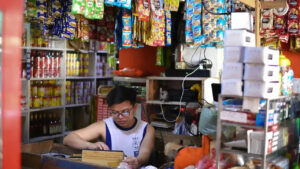MONTHLY SPENDING in small mom-and-pop stores, known as sari-sari stores, fell to P689 in 2024, from the 2023 average of P781, according to tech startup Packworks, which offers apps to help store owners manage their businesses.
“Packworks’ data also showed that while Filipinos on average spent less, they visited sari-sari stores more frequently,” it said. “Last year, its network of stores recorded an average of 18 monthly transactions nationwide, up 16% from 2023,” it added.
It said the practice of tingi — the purchase of the smallest quantities possible — was apparent in the frequent visits, signaling that affordability issues are preventing consumers from buying more than they need at the moment.
“The combination of Filipinos’ smaller basket sizes and more frequent visits to sari-sari stores points to a preference for buying in smaller, more affordable portions — the essence of the tingi economy,” Packworks Chief Data Officer Andoy Montiel said.
“This behavior likely stems from consumers needing to stretch their budget further, even in a lower inflation environment. They might be opting to buy only what they immediately need, rather than larger quantities less frequently to stock up,” he added.
It added that the average monthly basket size has dwindled since Packworks started tracking the indicator in 2022.
“In 2022, the average basket size was P800, which decreased to P781 in 2023 and reached its lowest point last year. This is despite the country hitting a 3.2% year-to-date inflation rate in 2024, the lowest in four years,” it added.
Of the 1 million monthly sales transactions tracked by Packworks, the largest decrease in value was posted by Region I, or the Ilocos Region, where monthly spending fell 31% to P570.
Large declines were also seen in the National Capital Region and Region VIII, or the Eastern Visayas, which posted 28% and 25% declines monthly spending to P702 and P508, respectively.
Regions IV-A (Calabarzon) and IV-B (Mimaropa) recorded the biggest monthly basket sizes of P1,027 and P1,237, respectively.
Last year, Region I turned in the highest number of monthly transactions at 26, followed by Region IX (Zamboanga Peninsula) with 25 and Region V (Bicol Region) with 20.
Packworks said seasoning and recipe mix items, detergent, powdered drinks, hygiene products, cigarettes, and liquor were the most commonly purchased items. — Justine Irish D. Tabile

